
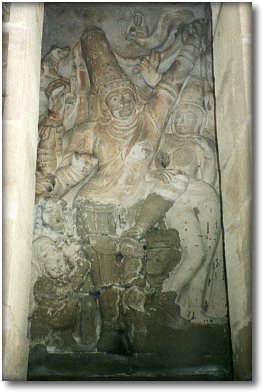 |
When to get there |
| Local Culture | |
| Money Matters | |
| Transportation | |
| Food and Hygiene | |
| Accommodation | |
| Weather Conditions | |
| Crime Rate | |
| Code of Conduct | |
| Purchasing Silk Sarees |
| WHEN TO GET THERE
Most temples open as early as 7.00 AM. Some might open earlier. This page will provide information on temple timings in the near future. Visiting any of the big temples in the early morning hours will be a good experience. The following temples are very good places to start your tour :
Varadaraja Perumal Temple Timings and events for the Sankara Mutt can be verified with the contacts for the Mutt through the official Mutt page. Kailasanathar Temple may not be opened so early since it is administered by the Department of Archeology. Vaishnavite temples, including :
Vaikunda Perumal Temple Ulagalanda Perumal Temple Pandava Thoodha Perumal Temple Yatokthakari Perumal Temple Deepaprakasa Perumal Temple Most small temples are closed between noon and evening. The afternoons may be the best time to walk around shopping for Silk Sarees or visiting the University. Back to the Top
Appearances can be deceiving. If you ever come across a middle aged man dressed in the simplest South Indian dhoti and shirt, riding down the road on a bicycle, don't ever make any assumptions regarding his wealth. Most of the city's millionaires lead that kind of a life. They do not believe in showing off their wealth by riding in the most recent imported luxury car (although certain newly rich people do that). A car is not so necessary for the veterans of the city's centuries-old silk industry. Inside the not-so-impressive house you see on a side street, you might find a bunch of handlooms running round the clock, earning upto a few hundred rupees every hour. Still, the bicyclist millionaire has all the time on earth when a visitor stops him and asks for directions and suggestions. Some of those people are masters of English and Hindi, in addition to the local Tamil. If you are lost, you can feel free to stop anybody and request them to help you with directions. Villager or millionaire, the person is definitely bound to give you honest directions or admit that he does not know. As it goes with any part of rural India, women can be quite shy and may not appreciate a stranger stopping them to ask for directions or any form of help, especially if the stranger is not a woman. Avoid them. Don't feel insulted if they just walk away as if they didn't hear you. It's not that they hate you. That is the way they act in the situation. Of course, if the person you stop gives an embarrassed smile and does not answer your question, understand this : That person does not understand your language. MONEY MATTERS
Wherever you go (with the exception of decent hotels, restaurants, and stores affiliated to temples), you are bound to pay more money. Life in the city revolves around bargaining. The locals have evolved better ways to tackle it. They usually bargain everywhere, trying to buy Apollo 11 for the price of an Airbus A-300 (and almost always, they succeed). If you are not good at bargaining, it is OK to pay a little more. The amount usually is not too high, and is definitely worth it. Unlike many other tourist spots around the world, you will not end up buying a fake artifact. The good news is, the priests in the temples are almost always sincere. Unlike some very famous temples in India, they don't demand money from visitors. Donations are always welcome. That doesn't mean that the priest will start abusing you if you don't donate money.
Back to the Top
Most travelers come to Kanchipuram in tourist buses, personal or rental cars. This saves a lot of time, not having to worry about transit between locations. This might even be a wiser choice that helps them avoid a lot of frustration. Most travelers come to Kanchipuram from Chennai (Madras). Several package tour agencies operate from Chennai. They might provide a comfortable trip that is not too heavy on the budget. Some travelers prefer taking rental cars, which might start at Rs.800 or so per day from Chennai. Searching for transportation inside the city can be quite an adventure. There is no reliable mass transit system. The best modes of transport inside the city itself are auto- and cycle-rickshaws. If you want to relish on the beauty of the city, Cycle rickshaws would be the best way. But, there is always the apprehension of being ripped off by the guys. Local people know the prevailing rates very well and bargain accordingly. The charge is not always proportionate to distance. It may vary depending on traffic and road conditions in the specific route. To go by a heuristic, cycle-rickshaws should not cost more than Rs. 5 per kilometer and auto-rickshaws not more than Rs. 10 per kilometer. On the better side, cycle-rickshaw guys are more reliable. You could talk them into a day's contract for about Rs. 150 or so for a day long trip to all corners of the city. This works out well you usually don't have to pay them in advance. Auto-rickshaws are considerably faster and could be twice as expensive, too. The day-long contract will work with them, as well. But, an advance payment may be necessary. Also, auto-rickshaw charges fluctuate wildly from day to day (They usually blame the inflation and petrol prices for that.) Needless to say, the ride would be very pleasant if you offer them a little more than they demand. Bargaining is the keyword. Back to the Top
There are hundreds of restaurants and snack shops throughout the city. Most of them would fail every test of hygiene, according to western standards. The locals (and even most Indians) don't mind them. The megamap of Kanchipuram in this site has a few places marked for restaurants. Those are the places where you will find the most hygienic restaurants in the city. A few of them have been listed in the Directory page. But, that is not the most up-to-date or comprehensive list. As always, ask the locals. They will spell out the names. But, yes!Good food is available in Kanchipuram. The best way to live in the city is to eat Vegetarian food. Decent non-vegetarian restaurants are rare. It is almost impossible to find anything other than South Indian food in the city. For foreigners who miss the burgers and pizzas, the best consolation can come from the local grocery store - bread and butter. Back to the Top
There are very few good lodges in Kanchipuram. This is because not many travelers stay in the city itself. So, building a lodge is not a very good business. Luckily, the situation is changing now. There still are very few lodges, but most of them are good. The good hotels are easily accessible from the Kanchipuram Bus Stand. Just ask the locals which is the best place to stay. The answer is almost always unanimous - the name of the best hotel. The locals know if anything better comes up. Although they never are going to stay in these hotels, they quickly make a comparison between the best hotel so far and the new one that just came up, to determine the better one. And, gossips carry the message along. Back to the Top
Weather is never a problem in Kanchipuram. All throughout the year, it is the same stable heat ranging between 28 C and 38 C. Occasional rains are possible.The weather does not fluctuate wildly. Where you might need to know about weather is when you plan your schedule. Almost all temples have floors made out unpolished stone planks. These get heated up with the sun. Remember that you have to walk in these temples with bare feet. That is all there is to worry about weather in Kanchipuram. CRIME RATE Crime in South India is nowhere in the near vicinity of crime in many western, and even North Indian cities. Kanchipuram, especially, has never seen real bad crimes that tourists need to worry about. It is an especially peaceful town, having had no communal riots even when the rest of India had big ones. The city maintained its peace during the Ayodhya-related riots in 1993. Even when the country's former Prime Minister Rajiv Gandhi was assassinated in Sriperumbuthur, barely 50 kilometers from the city, there never was any tension in the city itself. The worst kind of crime you will ever be a victim of is petty theft. Hence, secure your valuables. Being overcautious in crowded places is better than being sorry later on. Pickpockets are inevitable in highly crowded places. In the recent past, there were gang related incidents in dark corners of the city. Although it is believed that the situation is under control now, please avoid dark streets. The main streets are perfectly safe, even during the late night hours. Rest assured, Kanchipuram is probably one of the least likely places in the world where you might become victim to a violent crime. CODE OF CONDUCT
Good conduct is mainly expected inside the temples. As mentioned earlier, it is inappropriate to take footwear inside the temple premises. Foreigners who sometimes didn't know this practice (it is, after all, a common Hindu practice) have had bad experiences in the temples. Except the Archeological monuments such as the Kailasanathar and Vaikuntha Perumal temples, most temples have strict reservations against use of cameras inside the premises.Verify if photography is allowed in a particular spot in the temple premises. No matter what reply you get, it is highly inappropriate to photograph the main deity inside any Sanctum. If you are even carrying your camera into the Sanctum with no intention of taking any photographs, keep your camera safely inside a bag. Temple priests do not appreciate it if they see a camera in somebody's hand. After all, the person might have stolen a few snaps when they were not watching. Remember that some temples may not even allow non-Hindu's to enter the Sanctum. As far as attire goes, authorities in temples may at any time object to a person's entry into the premises on the basis of clothing. They almost always object to wearing shorts and other revealing clothes. Western tourists are common victims of this rule. Unlike the authorities in temples, the locals are rather amused at western attire and sometimes, even modern Indian attire. They make it very obvious by laughing right at the person and staring at him/her. Save yourself from such entertainment - the common Indian street clothes are the best things to wear for a trip to Kanchipuram. Back to the Top
In Kanchipuram, Silk Sarees are sold either through Co-operative societies or by private merchants. From the view point of the consumer, these two sources are almost the same, with a few small differences. As you might have learnt from the page on the Silk Industry, most of the large cooperative societies are government-run and hence have a very small profit margin. Also, the profits reach the weaver directly. Hence, cooperative societies are usually less expensive. Private merchants commonly have a larger profit margin. Private merchants also have other costs like advertising, middle agents, etc. Hence, expect their prices to be higher. Here's an insider tip. Sometimes, you might find sarees that are cheaper with a private merchant than with a co-operative society. Such a thing happens because the saree is weaved "cheaper" by using one or two strands of silk thread instead of three. There is nothing wrong in this practice. The saree is just not as strong or heavy as it is expected to be. Private merchants follow this practice to cater to customers who want wonderful sarees at lower prices.
Sometimes, both Private and Cooperative merchants take up custom orders. Many of them have albums of designs and colors to choose from. There is, however, one condition they place on such orders - the customer has to order multiple (usually multiples of 3) sarees. There is a reason for this. Handlooms do not usually weave one saree at a time. A single setup of yarn is normally 3 times as long as a regular saree. Hence, the output is typically 3 sarees in a single run. If the saree is less expensive and the particular design is in good demand, they will be able to accept custom orders for 1 saree and sell the other 2 through their showrooms. But, if the customer orders a very expensive saree or a design that is in poor demand, the merchants insist that the customer buy all 3 sarees.
Another important (You might find this a bit hilarious. But, please
don't ignore this.) :
|
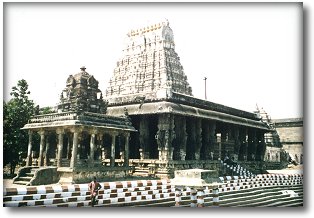 This page contains tips you can consider when planning a trip to Kanchipuram.
We are making the assumption that the trip is for just one day. Most people
visit Kanchipuram for just one day, anyway.
This page contains tips you can consider when planning a trip to Kanchipuram.
We are making the assumption that the trip is for just one day. Most people
visit Kanchipuram for just one day, anyway.
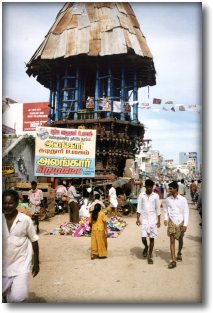 Kanchipuram is a pleasant rural town. Despite the recent explosion in the
physical size and sophisticated facilities in the town, the people are
basically villagers. Most of them are not yet aware of the greatness of
their own town. They haven't gotten used to the tourists and new money
flowing into the town. So, a visitor is always a respectable guest to them.
They are usually very kind to visitors. They can be rough, too. Kindness
and respect are always returned with twice the magnitude.
Kanchipuram is a pleasant rural town. Despite the recent explosion in the
physical size and sophisticated facilities in the town, the people are
basically villagers. Most of them are not yet aware of the greatness of
their own town. They haven't gotten used to the tourists and new money
flowing into the town. So, a visitor is always a respectable guest to them.
They are usually very kind to visitors. They can be rough, too. Kindness
and respect are always returned with twice the magnitude.
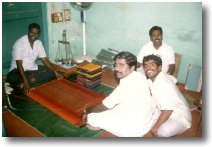 Kanchipuram
can be quite expensive for tourists - especially the ones who cannot by
any chance be mistaken for a local.
Kanchipuram
can be quite expensive for tourists - especially the ones who cannot by
any chance be mistaken for a local.
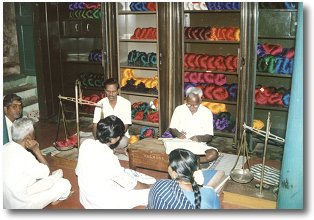 Along
with bargaining, tipping is also something that will make your life a lot
easier in the city. You can tip the Elephant handler in the temple to get
the elephant to pose for you (How else did I get the Ekambaranathar Temple
Elephant to pose for this web-site? ). You can tip the room-boy in your
hotel, and he will bring the world into your room. Most important of all,
in the small temples, you might usually find a care-taker, who will narrate
the story of the entire temple to you and let you take as many photographs
of the temple's treasures. Sometimes, they even advise you of the most
popular photographic locations in the temples.Tipping them is not an evil
deed, after all.Besides, that encourages them to be more helpful.
Along
with bargaining, tipping is also something that will make your life a lot
easier in the city. You can tip the Elephant handler in the temple to get
the elephant to pose for you (How else did I get the Ekambaranathar Temple
Elephant to pose for this web-site? ). You can tip the room-boy in your
hotel, and he will bring the world into your room. Most important of all,
in the small temples, you might usually find a care-taker, who will narrate
the story of the entire temple to you and let you take as many photographs
of the temple's treasures. Sometimes, they even advise you of the most
popular photographic locations in the temples.Tipping them is not an evil
deed, after all.Besides, that encourages them to be more helpful.
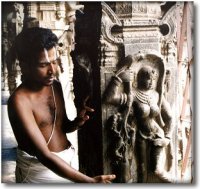 Being disciplined, kind-hearted people themselves, the people of Kanchipuram
do expect the same from visitors to their city.
Being disciplined, kind-hearted people themselves, the people of Kanchipuram
do expect the same from visitors to their city.
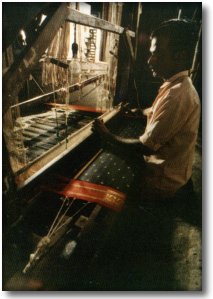 Although Kanchipuram Silk Sarees are available all over India and even
in many parts of the world, there indeed are people who prefer to come
to Kanchipuram to directly purchase Silk Sarees. Yet, there are many issues
to be concerned about, when purchasing a Silk Saree in Kanchipuram.Here
are a few:
Although Kanchipuram Silk Sarees are available all over India and even
in many parts of the world, there indeed are people who prefer to come
to Kanchipuram to directly purchase Silk Sarees. Yet, there are many issues
to be concerned about, when purchasing a Silk Saree in Kanchipuram.Here
are a few:
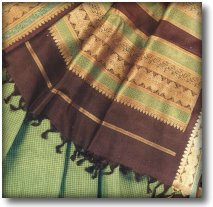 However, one could find that the variety of designs and colors available
in cooperative societies is very limited. Normally, the cooperative societies
do not undertake risky experiments with new colors or grand designs. Private
merchants, on the other hand, offer a much wider choice - the distinguishing
characteristic of private enterprise. So, if you are looking for a grand
saree and are willing to pay the price for it, you can find it with a private
merchant. Such sarees usually start at Rs.15,000 and go as high as a couple
of hundred thousands. An interesting fact is that some Kanchipuram-based
Silk merchants even hold several Guinness records for some fantastic, unique
sarees.
However, one could find that the variety of designs and colors available
in cooperative societies is very limited. Normally, the cooperative societies
do not undertake risky experiments with new colors or grand designs. Private
merchants, on the other hand, offer a much wider choice - the distinguishing
characteristic of private enterprise. So, if you are looking for a grand
saree and are willing to pay the price for it, you can find it with a private
merchant. Such sarees usually start at Rs.15,000 and go as high as a couple
of hundred thousands. An interesting fact is that some Kanchipuram-based
Silk merchants even hold several Guinness records for some fantastic, unique
sarees.
 Almost all Silk Cooperative Society Showrooms and most Private Showrooms
are located in and around the entire stretch of Gandhi Road (See
Almost all Silk Cooperative Society Showrooms and most Private Showrooms
are located in and around the entire stretch of Gandhi Road (See